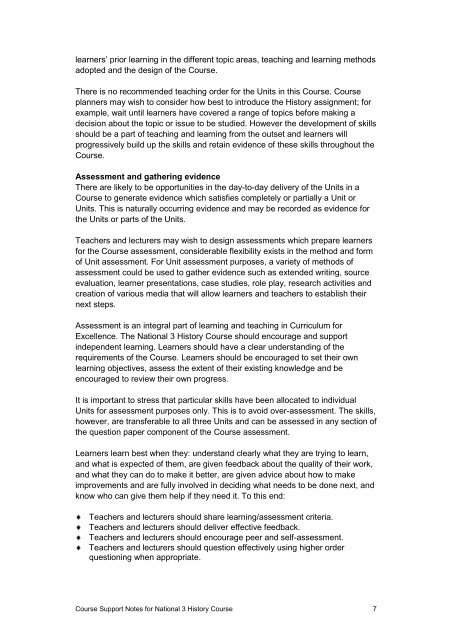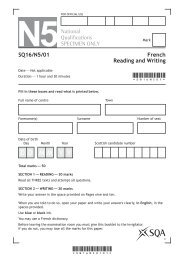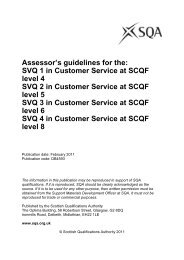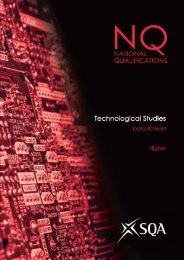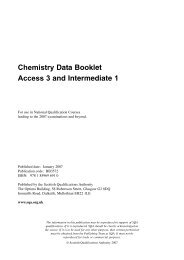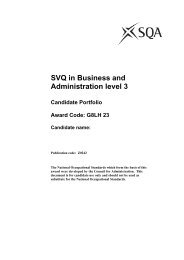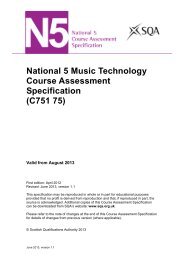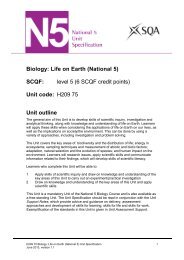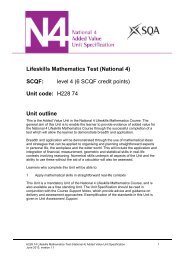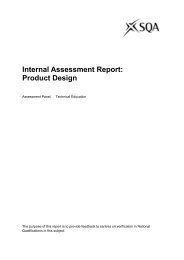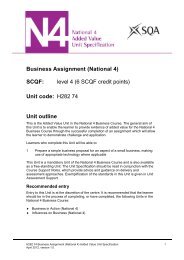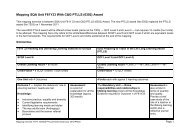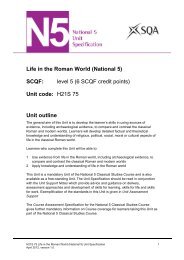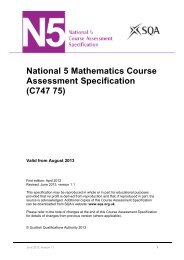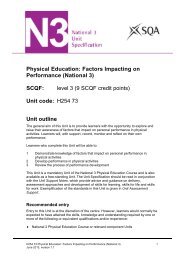National 3 History Course Support Notes - Scottish Qualifications ...
National 3 History Course Support Notes - Scottish Qualifications ...
National 3 History Course Support Notes - Scottish Qualifications ...
You also want an ePaper? Increase the reach of your titles
YUMPU automatically turns print PDFs into web optimized ePapers that Google loves.
learners’ prior learning in the different topic areas, teaching and learning methods<br />
adopted and the design of the <strong>Course</strong>.<br />
There is no recommended teaching order for the Units in this <strong>Course</strong>. <strong>Course</strong><br />
planners may wish to consider how best to introduce the <strong>History</strong> assignment; for<br />
example, wait until learners have covered a range of topics before making a<br />
decision about the topic or issue to be studied. However the development of skills<br />
should be a part of teaching and learning from the outset and learners will<br />
progressively build up the skills and retain evidence of these skills throughout the<br />
<strong>Course</strong>.<br />
Assessment and gathering evidence<br />
There are likely to be opportunities in the day-to-day delivery of the Units in a<br />
<strong>Course</strong> to generate evidence which satisfies completely or partially a Unit or<br />
Units. This is naturally occurring evidence and may be recorded as evidence for<br />
the Units or parts of the Units.<br />
Teachers and lecturers may wish to design assessments which prepare learners<br />
for the <strong>Course</strong> assessment, considerable flexibility exists in the method and form<br />
of Unit assessment. For Unit assessment purposes, a variety of methods of<br />
assessment could be used to gather evidence such as extended writing, source<br />
evaluation, learner presentations, case studies, role play, research activities and<br />
creation of various media that will allow learners and teachers to establish their<br />
next steps.<br />
Assessment is an integral part of learning and teaching in Curriculum for<br />
Excellence. The <strong>National</strong> 3 <strong>History</strong> <strong>Course</strong> should encourage and support<br />
independent learning. Learners should have a clear understanding of the<br />
requirements of the <strong>Course</strong>. Learners should be encouraged to set their own<br />
learning objectives, assess the extent of their existing knowledge and be<br />
encouraged to review their own progress.<br />
It is important to stress that particular skills have been allocated to individual<br />
Units for assessment purposes only. This is to avoid over-assessment. The skills,<br />
however, are transferable to all three Units and can be assessed in any section of<br />
the question paper component of the <strong>Course</strong> assessment.<br />
Learners learn best when they: understand clearly what they are trying to learn,<br />
and what is expected of them, are given feedback about the quality of their work,<br />
and what they can do to make it better, are given advice about how to make<br />
improvements and are fully involved in deciding what needs to be done next, and<br />
know who can give them help if they need it. To this end:<br />
Teachers and lecturers should share learning/assessment criteria.<br />
Teachers and lecturers should deliver effective feedback.<br />
Teachers and lecturers should encourage peer and self-assessment.<br />
Teachers and lecturers should question effectively using higher order<br />
questioning when appropriate.<br />
<strong>Course</strong> <strong>Support</strong> <strong>Notes</strong> for <strong>National</strong> 3 <strong>History</strong> <strong>Course</strong> 7


